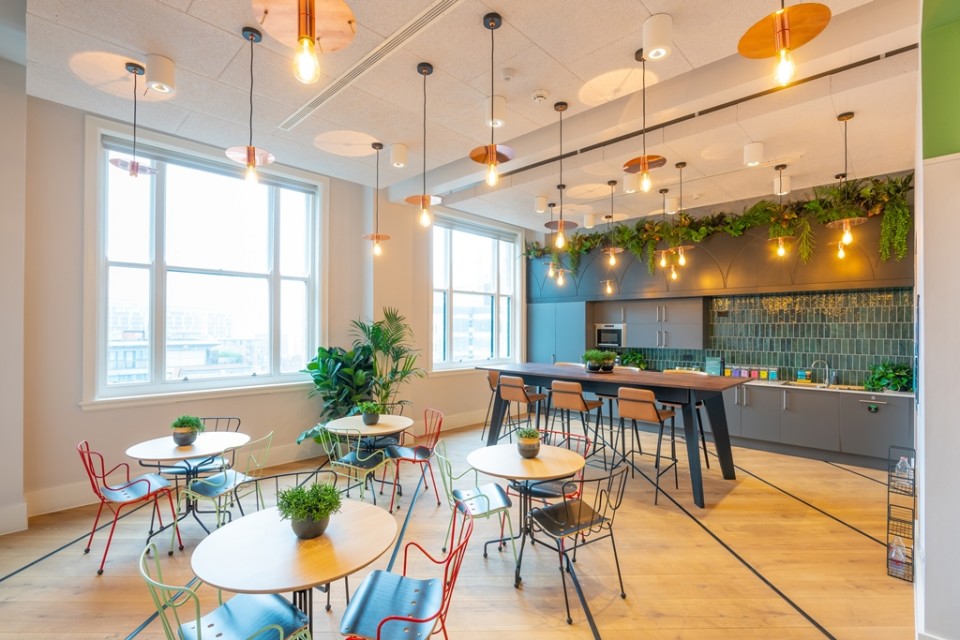Returning to the workplace of tomorrow
By Bruntwood

Andrew Cooke, regional director at Bruntwood Works, outlines how the lessons learned during the COVID-19 lockdown could shape the workplace of the future.
As the narrative around the current crisis shifts, and businesses across the UK look ahead to the shutters gradually lifting, thoughts are turning to what the future of workspace could look like. We know that our Bruntwood Works customers will likely return to their workspaces with fresh eyes and perhaps even new expectations, and office design will need to innovate in response.
After weeks of working from home, people will have missed seeing their colleagues and the wider community, and will place greater value in space that allows for more natural interactions. This isn’t just meeting rooms but informal spaces like shared lounges and coffee bars, or places with breakout seating or spaces to host events. In Blackfriars House, our newly refurbished Pioneer workspace in Manchester, we’ve installed a podcast booth in the style of a 1920s library, complete with bookshelves and armchairs. These types of spaces offer a type of space which home working just can’t provide - a more vibrant setting for teams to work together and an opportunity for the workspace to be opened up to the use of the wider community.
Part of working from home also means that many people will be working in spaces that match their personalities. We all have different cognitive needs for different tasks. Some people do their best, most creative work in quiet spaces, others in busy open areas with music and more human interaction. After so many weeks at home, it might seem alien for people to return to uniform working environments. Providing spaces for all will help harness productivity and motivation - something which is going to be vitally important to the economy over the coming months.
We’ve all appreciated or even, at times, chuckled at the artwork adorning the walls of colleagues’ homes during video calls, which goes to show how creativity opens up discussion. This newfound recognition of the benefits of art for promoting the sharing of ideas will come to the fore in the workplace of tomorrow. Art connects businesses to the wider community, and it’s something we’ve focused on for a while. In Birmingham, we’ve run an artists-in-residence scheme designed to help kick start the careers of emerging artists in the city, with two local artists winning a free studio space for a year at our Cornwall Buildings last year.
Health and wellbeing at work, whether that’s physical or mental, was already becoming mainstream in workspace design before the current crisis hit. If anything, we should expect greater emphasis on wellbeing as people return to offices. Clean air monitoring and more natural style lighting, like circadian systems that reflect the body’s natural rhythm, are all innovations that will take on renewed importance and supercharge the user experience.
Nature and sustainability will also be at the core of design and has become a focus for many during lockdown. Expect to see external living walls made of hundreds of individual plants and cascading interior gardens taking centre stage, to create the backdrop of an urban oasis.
The changed pace of life will accelerate the drive for facilities which support the changing needs of employees. Sleep pods, quiet study areas, cinema rooms, fitness studios, complemented by showers and changing facilities, and spaces to host pop-up events, will be increasingly popular features.
Video meetings have proven their ability to effectively replace many face-to-face meetings, so firms may realise that they don’t need to allocate quite so much budget to long distance travel every month, with the added bonus that people could spend less hours commuting, and more valuable time with family and friends. Perhaps we can expect to see a workforce spreading its time between home and the office, meaning our workspaces will need to accommodate more video meeting facilities and portable technology. In turn, this might mean less fixed desk space as hot-desking and remote working become more standard.
Despite the challenges the lockdown has thrown at people across all aspects of society, surveys have shown an optimism for what life will be like post-COVID-19, especially among younger generations. One thing we can all be certain of is that every area of our lives will be altered in some way, big or small, and this will most definitely include the workplace.